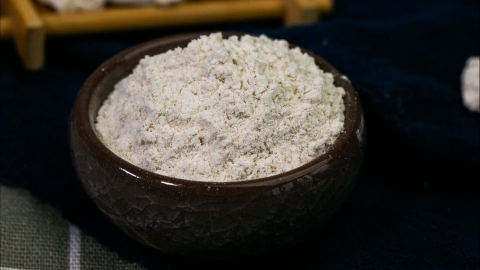Benefits and Risks of Consuming Kudzu Root Powder
The benefits of consuming kudzu starch generally include regulating endocrine function, protecting the cardiovascular system, relieving fever and promoting body fluid production, enhancing immunity, and improving intestinal function. Possible adverse effects may include hormonal imbalances, spleen and stomach damage, hypoglycemia, allergic reactions, and worsening of hypotension.

I. Benefits
1. Regulating Endocrine Function: Kudzu starch is rich in kudzu isoflavones, which have estrogen-like effects. It can regulate female endocrine function, alleviate menstrual discomfort and menopausal hot flashes caused by estrogen fluctuations, and improve skin condition, making the skin smooth and radiant.
2. Protecting Cardiovascular Health: The puerarin in kudzu starch can dilate the coronary arteries and cerebral blood vessels, reduce blood viscosity, increase blood flow, help prevent myocardial ischemia and cerebral hypoperfusion, and contribute positively to cardiovascular health.
3. Relieving Fever and Promoting Body Fluids: Traditional medicine considers kudzu starch to be cool in nature and effective in relieving muscle fever, reducing fever, promoting saliva production, and quenching thirst. It is suitable for consumption during heat syndromes such as fever, thirst, and dry throat, helping alleviate symptoms and promoting recovery.
4. Enhancing Immunity: It contains various nutrients and active substances that can promote the activity and function of immune cells, helping the body resist pathogenic bacteria and improve resistance, thereby reducing the likelihood of illness.
5. Improving Intestinal Function: The dietary fiber in kudzu starch can promote intestinal motility, increase stool volume, prevent and relieve constipation, maintain normal digestive and excretory functions, and support intestinal health.
II. Adverse Effects
1. Hormonal Imbalance: Long-term and excessive consumption may disrupt the body's hormonal balance due to its estrogen-like substances, leading to elevated estrogen levels. Women may experience menstrual disorders and breast hyperplasia, while men may develop gynecomastia and other symptoms of endocrine disorders.
2. Spleen and Stomach Damage: Kudzu starch is cold in nature; individuals with spleen and stomach cold deficiency may experience further depletion of yang energy, worsening symptoms of spleen and stomach weakness, and may develop indigestion symptoms such as abdominal pain, diarrhea, and loss of appetite.
3. Hypoglycemia: Kudzu starch has a certain regulatory effect on blood sugar levels. Excessive consumption may cause blood sugar to drop too low, leading to hypoglycemic reactions such as dizziness, fatigue, and palpitations, particularly requiring caution among diabetic and hypoglycemic individuals.
4. Allergic Reactions: Some individuals may be allergic to kudzu starch, experiencing symptoms such as skin itching, rashes, throat swelling, difficulty breathing, and in severe cases, life-threatening allergic reactions.
5. Worsening Hypotension: Kudzu starch has a certain blood pressure-lowering effect. Individuals with inherently low blood pressure may experience further drops in blood pressure upon excessive consumption, resulting in symptoms such as dizziness, visual darkening, and limb weakness, which may affect overall health.
Consuming kudzu starch offers numerous benefits but also carries some potential risks. Therefore, it is important to consume it in moderation and pay attention to individual physical condition and health status when doing so.








